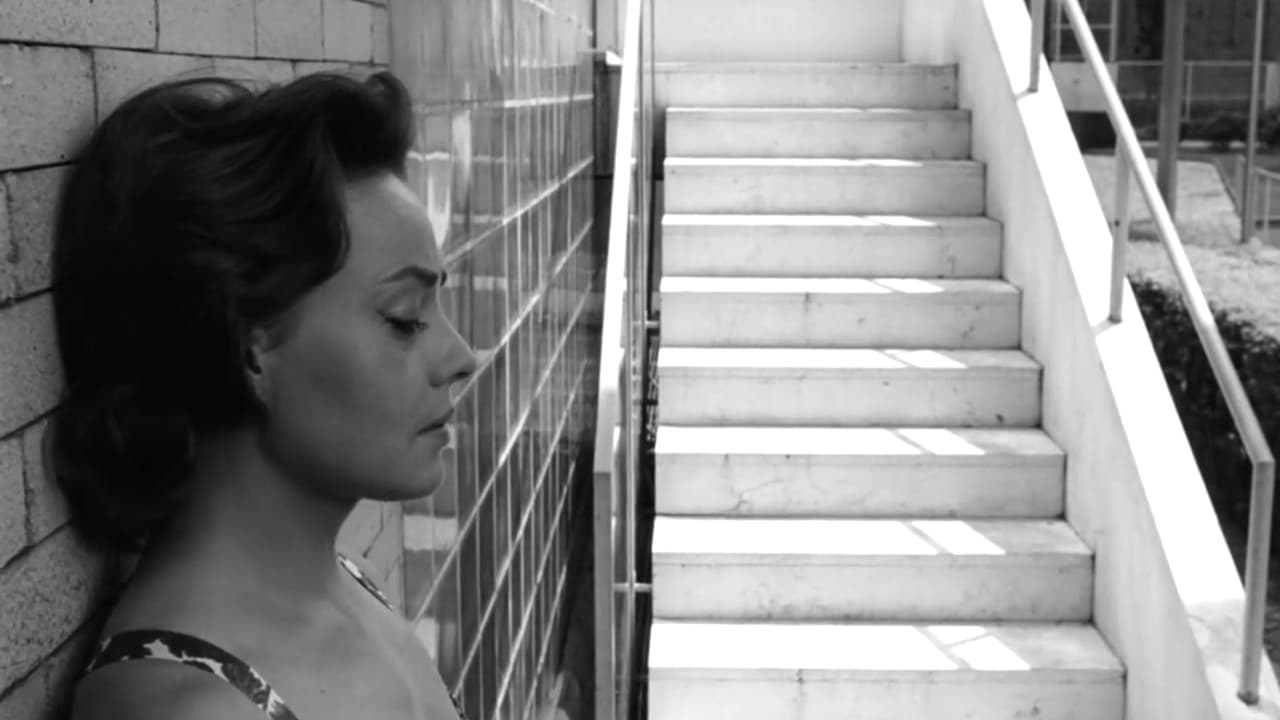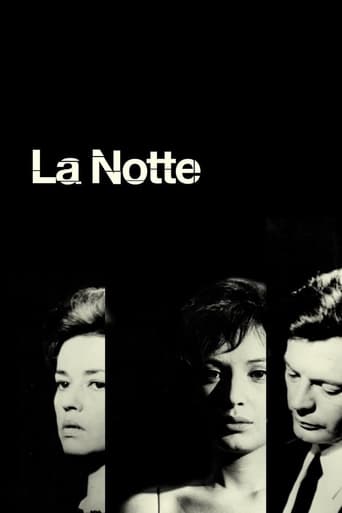

Surprisingly incoherent and boring
... View MoreEach character in this movie — down to the smallest one — is an individual rather than a type, prone to spontaneous changes of mood and sometimes amusing outbursts of pettiness or ill humor.
... View MoreEasily the biggest piece of Right wing non sense propaganda I ever saw.
... View MoreJust intense enough to provide a much-needed diversion, just lightweight enough to make you forget about it soon after it’s over. It’s not exactly “good,” per se, but it does what it sets out to do in terms of putting us on edge, which makes it … successful?
... View MoreLa notte is usually said to be the second of the so-called "existential tetralogy" together with L'Avventura, L'eclisse and The Red Desert.Like L'Avventura, La Notte as well has a central theme a love story, but a story of a couple (wonderfully played by Mastroianni and Jeanne Moreau) going through a deep crisis, that has almost come to an end. From the emptiness of their house, we move to a likewise empty party. The night setting is what allows the characters in the film to move away from the borders of their personality and degenerate, do things that the night itself can hide and that keeps for itself.In fact, when the sun rises, everything is much calmer and the light shows things in a different way, even the couple's relationship. Like Antonioni once said during an interview: "you don't need much to collapse, to surrender" it's easy to forget about the things that surround us.Antonioni always reminds us that talking isn't necessary, that silence is a big lesson we can learn from.
... View MoreDirected by Michelangelo Antonioni (L'Avventura, L'Eclisse, Blowup), this entry in the 1001 Movies You Must See Before You Die book is like many of the other entries was an Italian film I hadn't heard of before, but was willing to try because of the recommendation. Basically set in Milan, distinguished and successful writer Giovanni Pontano (La Dolce Vita's Marcello Mastroianni) and his beautiful wife Lidia (Jules et Jim's Jeanne Moreau) visit their friend Tommaso Garani (Bernhard Wicki) who is dying of a terminal illness and unable to hide his severe pain, Tommaso praises his the release of Giovanni's new book La Stagione (The Season), Lidia leaves the room shaken by the dying man, Giovanni stays a bit longer, and as he leaves the room a sick and uninhibited young woman attempts to seduce him before nurses interrupt. Giovanni does not comfort his crying wife outside, and Lidia dismisses the incident with the young woman, so they attend a party celebrating the new book release, it has been well received and Giovanni signs copies with his wife looking on from a distance, she eventually runs off, still devastated by Tommaso's condition, and wanders the streets of Milan, including where she and her husband became newlyweds. Back at their apartment Giovanni hears from his wife, there is no sentimental value as he picks her up from their old neighbourhood, going to a nightclub they watch a mesmerising and seductive performance by a female dancer and have some small talk, and eventually they move on to a swanky party thrown by millionaire businessman Mr. Gherardini (Vincenzo Corbella). At the party while Giovanni socialises Lidia walks around in boredom, Giovanni next meets the host's lively and charming daughter Valentina Gherardini (L'Avventura's Monica Vitti), they flirt and play a game together that gathers others to see a competition, and later alone together they share a kiss together, with Lidia looking on from above. Giovanni is next offered an executive position by Mr. Gherardini with his company to write the firm's history, he is reluctant but leaves the offer open, he doesn't need the money because of Lidia's family wealth and his own publishing earnings, meanwhile Lidia finds out from the hospital by telephone Tommaso has died, overwhelmed by grief she watches the party guests enjoying themselves, sitting alone Giovanni does walk over to her, she does not tell of the death, and he soon leaves her alone to follow after Valentina. Lidia gets up and appears to enjoy the band music, and accepts a dance from a man named Roberto (Giorgio Negro), then moments later it rains, some guests but many jump into the near swimming pool, Roberto stops Lidia from doing the same and takes her in his car, she enjoys his company and conversation, but she turns away and apologises when he is about to kiss her. Back at the party Giovanni finds Valentina again, she knows he is married and instructs him to spend the rest of the evening with his wife, he reveals to her he is having a life "crisis", while they return the guests Lidia and Roberto also return from their drive, Giovanni is annoyed by her behaviour, Valentina is confronted by Lidia as she dries off in her room, Giovanni overhears them talking and his wife telling that she feels like dying and ending her life of agony, noticing Giovanni she does tell him she is not jealous of his playing around, the couple leave the party as morning approaches and the band still playing. As the walk together across Gherardini's private golf course Giovanni tells he will turn down the job offer and Lidia finally tells of Tommaso's death, she also tells that Tomasso had affection for her, but she chose Giovanni because she loved him, she says she feels like dying because she no longer loves him, he recognises their marriage is failing and says that he still loves her, then she pulls out a letter that he wrote before they were married and reads it aloud. Giovanni embraces and kisses his wife, but Lidia resists and says that she no longer loves him and she knows he does not love her, but he is unable to endorse his failure, so he continues to make love to her in the golf course sand trap under the grey morning sky. The title says it all, it is one night and the study of a marriage for a couple as their love crumbles and by the end disintegrates, despite apparently loathing their parts Mastroianni as the uninspired novelist and Moreau as the ignored wife do give great performances, I agree it is a little dated, but I can see the similarities and inspiration for Stanley Kubrick's Eyes Wide Shut, and it is a most interesting and watchable drama. Very good!
... View MoreIt's not because of films like this that Antonioni is great for me, it's because he tutored with them and grew wiser for his later more important works. Because having dissected with simple precision the crushing dilemmas of whether or not love is possible, realizing this ineffability of human connection, he could see this was not the end of our suffering and if this was not the end, we could still not rule conclusively that we have no chance to attain peace in this life.After he concluded with the two lovers willingly not pursuing their feelings at the end of L'Eclisse, he turned inwards, and with each subsequent film he peered under one more veil of false perception. But what was he trying to look into in La Notte, what does he find here? La Notte is a step behind L'Eclisse, naturally. Here love matters, or is thought that it should, to the bitter end. The finale is overbearing with pessimism then because love fails to be that saving grace, that we're still alone, consumed by our desires. But that's not all of it either.Even when Mastroyanni painfully knows that the love he cherished has vanished with time and habit, he still clings to it. Even a dragging routine is preferable than the emptiness of solitude. This is how love functions here, as a shelter that soothes the existential pains, or a mask that mercifully obscures them.But these people are not simply lost adrift in faceless crowds and cold rooms, they're clinging on the craving of desire for their salvation. When I say that the mind is not transcended yet in these films of Antonioni's alienation phase, it's because it still dictates desire, the terms under which a meaningful life should be pursued.But to show that love is not our saving grace because it's subject to the whims and tedium of time would be to concede that we are merciless at the hands of higher forces beyond our control, that we're not masters of our fate. It was important in this aspect to go a step beyond, to show us characters become aware of the emptiness of desire by willingly giving up on it. But for that we'd have to go ahead to L'Eclisse and Il Deserto Rosso.By itself La Notte may seem like it's laboriously pondering to say too little. As part of an oeuvre though, it has a place that can't be dismissed lightly.
... View MoreI found La Notte as absorbing as L'Avventura - that is to say that I had to work a bit with it. For all that La Notte is inherently more appealing in many ways (the incidents have an inherent urban interest, like documentary) it is a rather thin film. Whereas L'Avventura has the double drama of a thriller and the bizarre dissemination of that thriller, La Notte has very little interpersonal surface drama to speak of.The principal couple, Giovanni and Lidia are a study in middle-class ennui. Two parties form the contours of the film: the first, a celebration for Giovanni's new publication; the second, the Notte of the title - a gaudy, all-night affair thrown by the suburban nouveau riche in which various half-hearted amorous situations fizzle out for both. At surise, the couple address their stymied love in an ambiguous close to the movie.The urban sprawl as reflected in Milan's Pirelli building and underpinned with Giorgio Gaslini's otherworldly electronic sounds opens the film with a statement about modernism - not that it is bad but that it is Antonioni's subject, new, possibly impervious to investigation but certainly central and influential. Indeed existential impotence is a theme for Giovanni - his doppelganger, the lothario Roberto, is not good for anything at all but he does have a good car. Machines feature in this film, helicopters, a plane - the aforementioned car defers to a sleek train at a level crossing - and young men play with rockets in a sequence which also takes in a punch-up.Marcelo Mastroianni and Jean Moreau were clearly the chief practitioners of listless wandering around the early 1960s and do Antonioni's bidding capably here. Monica Vitti's strange cameo is relatively exciting although not entirely to the point. I liked the way in which Antonioni goes about collating his shots and symbols, and admire much of the choreography of the party. However, I'm not sure that in order to make a film about the ontological pain of being bored one has to bore one's audience as well. 4/10
... View More